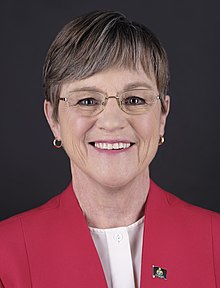The governor of Kansas is the head of state of Kansas[2] and the commander-in-chief of the state's military forces.[3] The governor has a duty to enforce state laws,[2] and the power to either approve or veto bills passed by the Kansas Legislature,[4] to convene the legislature at any time,[5] and to grant pardons.[6]
| Governor of Kansas | |
|---|---|
 | |
 Standard of the governor | |
| Government of Kansas | |
| Residence | Cedar Crest |
| Term length | Four years, renewable once consecutively |
| Inaugural holder | Charles L. Robinson |
| Formation | February 9, 1861 |
| Salary | $99,636 (2017)[1] |
| Website | governor |
Since becoming a state, Kansas has had 48 governors. The state's longest-serving governors were Robert Docking, John W. Carlin, and Bill Graves, each of whom served 8 years (Docking served four two-year terms; Carlin and Graves each served 2 4-year terms). The shortest-serving governor was John McCuish, who served only 11 days after the resignation of Fred Hall.
The current governor is Democrat Laura Kelly, who took office on January 14, 2019.
List of governors
Kansas Territory
Kansas Territory was organized on May 30, 1854, from land that had previously been part of Missouri Territory.[7] Despite existing only for six years, it had six governors appointed by the president of the United States.
| No. | Governor | Term in office[lower-alpha 1] | Appointed by | |
|---|---|---|---|---|
| 1 |  |
Andrew Horatio Reeder (1807–1864) [8] |
June 29, 1854[lower-alpha 2] – July 31, 1855 (removed)[lower-alpha 3] |
Franklin Pierce |
| 2 |  |
Wilson Shannon (1802–1877) [11] |
August 10, 1855[lower-alpha 4] – August 18, 1856 (resigned)[lower-alpha 5] |
Franklin Pierce |
| 3 |  |
John W. Geary (1819–1873) [14] |
July 31, 1856[lower-alpha 6] – March 4, 1857 (resigned)[lower-alpha 7] |
Franklin Pierce |
| 4 |  |
Robert J. Walker (1801–1869) [17] |
March 30, 1857[lower-alpha 8] – December 17, 1857 (resigned)[lower-alpha 9] |
James Buchanan |
| 5 |  |
James W. Denver (1817–1892) [18] |
February 24, 1858[lower-alpha 10] – November 8, 1858 (resigned)[lower-alpha 11] |
James Buchanan |
| 6 |  |
Samuel Medary (1801–1864) [21] |
November 23, 1858[lower-alpha 12] – December 20, 1860 (resigned)[lower-alpha 13] |
James Buchanan |
State of Kansas

The eastern bulk of Kansas Territory was admitted to the Union as Kansas on January 29, 1861.[25] The Kansas Constitution provided that a governor and lieutenant governor be elected every 2 years, for a term commencing on the second Monday in the January after the election.[26] An amendment in 1972 increased terms to four years, with a limit that a governor could not serve more than two terms in a row, and provided that the governor and lieutenant governor are elected on the same ticket.[27] In the original constitution, should the office of governor be vacant, the powers would devolve upon the lieutenant governor, who nonetheless would remain in that office;[28] the 1972 amendment changed it so that, in such an event, the lieutenant governor becomes governor.[29]
Until 2018, there was no age or residency requirement to run for the office; in 2017, three teenagers were doing so.[30] In 2018, a law was passed establishing the age to run for governor and lieutenant governor at 25.[31]
See also
Notes
- Reeder was dismissed by President Franklin Pierce, "on the tenuous grounds of illegal land speculation" when he refused another appointment.[8]
- Shannon resigned, frustrated at how ungovernable he found the territory.[11]
- Geary resigned, "discouraged and feeling betrayed" due to the violence he had experienced.[14]
- Walker was appointed on March 30, 1857, during a Senate recess; he was never confirmed by the Senate. He gave his inaugural address on May 27.[17]
- Walker resigned following constant attack by pro-slavery forces and lack of support from the federal administration.[17]
- Denver resigned, tired of the constant strife and lack of support from the federal administration. He submitted his resignation on October 10, 1858, to take effect upon the arrival of his successor, but he left the territory on November 8.[18]
- Medary resigned following the election of Abraham Lincoln to president;[21] he had already lost the election to be the first state governor.[24]
- Crawford resigned to take command of the 19th Kansas Infantry.[40]
- Represented the Republican Party
- Humphrey instead ran unsuccessfully for the United States House of Representatives.[71]
- Stubbs instead ran unsuccessfully for the United States Senate.[99]
- Capper was instead elected to the United States Senate.[107]
- Reed lost the Republican nomination to Frank Haucke.[123]
- Landon instead ran unsuccessfully for President of the United States.[131]
- Carlson resigned; he had been elected to the United States Senate to replace Harry Darby, and Darby resigned early so that Carlson could be appointed to the seat early by his replacement as governor, Frank L. Hagaman.[147]
- Hagaman had already lost the Republican nomination to Edward F. Arn.[151]
- Hall resigned so that his successor would appoint him to the Kansas Supreme Court; he had already lost the Republican nomination to Warren W. Shaw.[158]
- Under a 1972 amendment to the constitution, governors may not be elected to more than two successive terms.[181]
- Sebelius resigned, having been confirmed as United States Secretary of Health and Human Services.
- Brownback resigned, having been confirmed as United States Ambassador-at-Large for International Religious Freedom.
- Colyer lost the Republican nomination to Kris Kobach.
- Kelly's second term began on January 9, 2023, and will expire on January 11, 2027; she will be term-limited.
References
External links
Wikiwand in your browser!
Seamless Wikipedia browsing. On steroids.
Every time you click a link to Wikipedia, Wiktionary or Wikiquote in your browser's search results, it will show the modern Wikiwand interface.
Wikiwand extension is a five stars, simple, with minimum permission required to keep your browsing private, safe and transparent.

















































